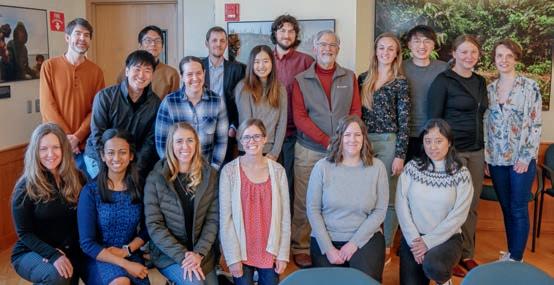
2 minute read
Students Build StoryMaps, Camaraderie at Arctic Data Stories Workshop
On March 29, 2022, students from Harvard and the greater Boston area traveled to Woodwell Climate Research Center for the final session of the Arctic Data Stories Workshop.
On a brisk Sunday morning in late March, nineteen students from Harvard and the greater Boston area boarded a bus to Woodwell Climate Research Center in Falmouth, Massachusetts, for the final session of the 2022 Arctic Data Stories Workshop. After weeks of lectures and group work, they were eager to present their interactive StoryMaps to an audience of experts on Arctic climate science, policy, and communication. For the second year running, the Arctic Initiative teamed up with Woodwell Climate Research Center and Esri to host Arctic Data Stories, a workshop designed to let students explore geospatial data and policy while providing them practical training in ArcGIS software. Beginning in February, the participants devoted five Fridays to listening to renowned experts on Arctic climate science and policy, mapping, and science communication, including Woodwell’s Jennifer Watts, Darcy Peter, Stefano Potter, Greg Fiske, and Carl Churchill; Esri’s Dawn Wright and Allen Carroll; and Arctic Initiative Senior Fellow Fran Ulmer and Research Fellow Nadezhda Filimonova. “The workshop’s goal was to advance students’ skills in communicating Arctic science for diverse audiences using storytelling and data visualization. My personal hope was for students to think of the ways they can apply the received knowledge either in their studies or professional work and to become more involved with Arctic research,” said Filimonova, the lead workshop organizer from HKS. The students formed small groups to create StoryMaps, web-based narratives that contextualize geography, on an Arctic policy question of their choosing. Topics ranged from Arctic sea ice retreat to marine biodiversity conservation to the social impacts of permafrost thaw. Equally diverse were the participants themselves: hailing from nine countries and a variety of backgrounds, this year’s cohort included students from Harvard Kennedy School, the Graduate School of Arts and Sciences, the Graduate School of Education, Harvard Business School, and five other universities, as well as a high school science teacher, a children’s book author, and an engineer. According to HKS student Isaac Kim, the breadth of professional experience within his group and the interdisciplinary nature of the workshop led his team to take a more holistic view of the Alaskan energy transition. “From consulting to research in rare earth minerals to innovative research technology, we each brought different perspectives to working through the issues related to a clean energy transition. These differences pushed our conversation to consider questions of justice for Alaskan Native communities, environmental impacts, feasibility of mining, and governance structures.” After two years of virtual learning and programming due to the pandemic, the workshop and visit to Woodwell’s campus also represented a welcome opportunity to strengthen camaraderie between young scholars with a shared interest in the Arctic. Brittany Janis, Arctic Initiative Associate Director and workshop co-organizer, said: “It was amazing to see the level of community and dedication that was built by the end of the workshop. It built a great community of young leaders who will hopefully keep collaborating long after their projects are done.”










